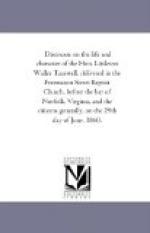An incident which shows the character of Tazewell in an amiable point of view deserves a passing allusion. When he had retired for some time from general practice in our courts, he was induced to argue in the Superior Court in Portsmouth a memorable case of insurance in which he had been consulted; and, for the benefit of the junior members of the bar, he discussed all the difficult and leading points of the case at full length, and with all his ability, and made an impression upon the court, and upon the bar, which was gratefully and delightfully remembered.
The Cochineal case, rather from the rumors growing out of it, than from the case itself, which, however, embodied some important doctrines of the law of prize, and a large sum of money, deserves a passing allusion. The name of the case is the Santissima Trinidad, and the St. Andre, which was argued in the Supreme Court of the United States in 1822, on an appeal from the Circuit Court of Virginia, and is reported in seventh Wheaton (283-355). This was a libel filed by the Consul of Spain in the District Court of Virginia, in April, 1817, against 89 bales of cochineal, two bales of jalap, and one box of Vanilla, originally constituting part of the cargoes of the Spanish ships Santissima Trinidad and St. Andre, and alleged to be unlawfully and piratically taken out of those vessels on the high seas by a squadron consisting of two armed vessels, the Independencia del Sud, and the Altravida, under the command of Don Diego Chator, who sailed under a commission from the Government of the United Provinces of the Rio de la Plata—that Government having been, or being a dependency of Spain, and its independence not having been acknowledged by Spain or by the United States. Tazewell was employed by the Spanish Consul, M. Chacon, whose person is so familiar to our older citizens; and he gained the case in the Federal District and Circuit Courts, following it, contrary to his usual custom, to the Supreme Court. The case was argued in 1822, Winder and Ogden for the appellants, and Tazewell and Webster for the appellees. The questions involved were points of the law of prize, and are too technical for this presence; but the speech of Tazewell, condensed and mutilated as it is in the report, is an admirable specimen of argument on purely legal topics which were to be worked out in the new political relations of the world, and to be settled by the law of nations. He gained the case in all the courts. John Randolph attended the trial in Washington, and was evidently alarmed at the trepidation




